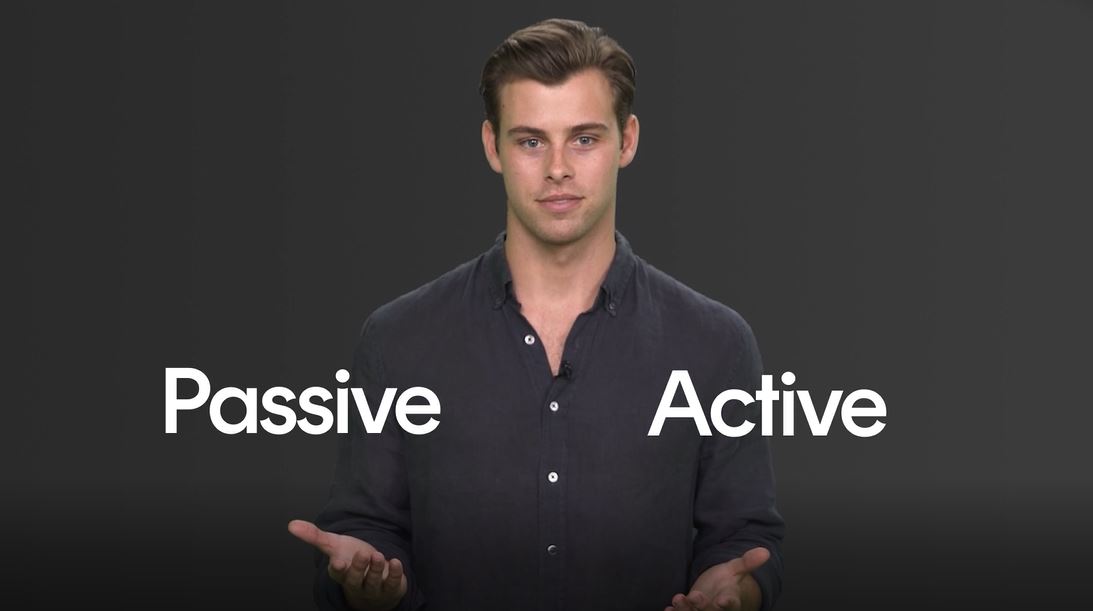Want to read it later?
Send the lesson to your inbox
Lesson 7 transcript
Here, we explain a few different ways you can approach investing. You may find that your investment style is a mix of the below, especially over time as your financial goals change, as you grow older – or as you learn more about investing.
Active vs Passive
There are two main philosophies when it comes to investing. The approach that resonates with you is likely to become the bedrock of your investment strategy.
There’s no ‘right or wrong’ approach, and you can incorporate both within your overall investment portfolio. Ultimately, the approach you choose may come down to a few things:
- Your time and dedication to investing, or how ‘hands on’ you want to be
- How much you’re willing to spend on fees
- Your tolerance to risk
Active investing
Active investors try to identify good companies (or other assets) to invest in, with the aim of outperforming a broad market index, such as the ASX 200, the S&P 500 or the Nasdaq.
Stock-picking is more difficult than it may seem
This approach requires lots of research and confidence when making investment decisions, and typically involves higher risk. This is why some active investors choose to pay the ‘experts’ – professional fund managers to actively manage their investments on their behalf.
Actively managed funds typically have relatively high management fees, sometimes with an additional performance fee for those years when they outperform the benchmark index.
Over the years, fees can really eat into investor returns.
The potential for actively managed funds to outperform the market comes down largely to the skill of the fund’s investment manager, and to the fees they charge.
Passive investing
Being an active investor, and choosing investments like individual stocks, can be overwhelming. The seemingly endless opportunities and the pressure to ‘make the right choice’ can make for ‘analysis paralysis’.
So, if you want to invest your money in stocks, but don’t have the expertise or time to select specific companies yourself, or the budget to spend more on fees for an active fund manager, passive investing – usually by investing in an ETF – is a popular option.
Passive investing is often seen as a cost-effective way to invest, and tends to suit those who would rather take more of a ‘set and forget’ approach and have a lower risk tolerance than active investors.
A passive investor typically has a buy and hold mentality, trading minimally with the goal of building their wealth over the long-term and ignoring short-term setbacks or market downturns. Their aim is to track the performance of a market index in anticipation that their portfolio will appreciate over time.
Summary
Active investing
- Seek to beat a market index
- Pick investments based on potential returns i.e. ‘stock picking’
- Generally higher fees
- Generally trades more frequently
Passive investing
- Seek to mirror the returns of a market index (before fees and expenses)
- Replicate the company holdings within a market index i.e. buying the whole sharemarket, or a specific part of the sharemarket
- Generally lower fees
- Generally trades less frequently
Which approach works better?
Common sense dictates that if you pay more for a service, it should be better. Therefore, if you pay an active manager more than a passive manager, they should provide you with better returns, right? Well, maybe not.
In 1973, Princeton University professor Burton Malkiel claimed in his bestselling book, A Random Walk Down Wall Street, that “A blindfolded monkey throwing darts at a newspaper’s financial pages could select a portfolio that would do just as well as one carefully selected by experts.” So essentially, a chimpanzee could select stocks just as well as even a professional fund manager picking stocks.
Many investing greats such as Warren Buffet have recommended passive funds, like ETFs, over active funds – it’s arguably better bang for your buck.
“In my view, for most people, the best thing to do is owning the S&P 500 index fund,” said Buffett at his 2020 shareholder meeting.
Ultimately, different investors will have different views on the philosophy, but both active and passive investing can have a place in an investor’s portfolio.
For example, you may choose to invest the bulk of your funds in an ETF tracking a broad market index, such as the S&P/ASX200, or the Nasdaq 100, and allocate a smaller amount to individual shares of your choice that you believe have strong performance potential.
Other investing strategies
Growth
A growth investor’s goal is to profit from the increasing share price of companies with fast-growing revenues or profits. Investors expect the share price to rise as profits rise and reap the reward when they sell their shares.
Income
An income investor’s goal is to create an income stream from their portfolio. They look for companies that pay high, regular dividends. Income investors also typically have investment allocations in fixed income (bonds).
Investors expect to earn a return from dividends but may not expect big capital gains.
Value
Value investors seek to maximise returns by finding shares in the market that they consider to be undervalued.
Value investing requires a lot of research and careful decision making – but the effort can be rewarding.
Responsible investing
Responsible investing means investing in companies that demonstrate positive environmental and social impact characteristics.
Responsible investors tend to screen out companies that don’t align with their ethics, such as those involved in weapons, tobacco, alcohol and gambling. Or, they may positively screen for companies involved in renewable energy, climate change impact or those making a difference in gender diversity.











